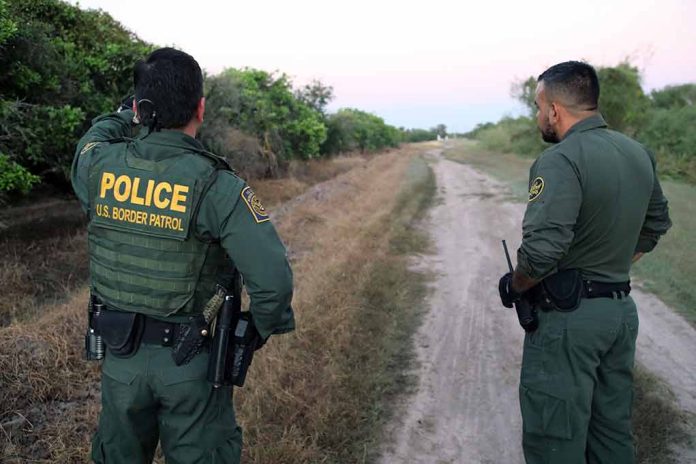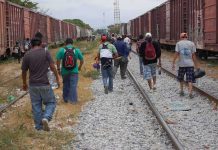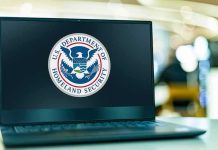
U.S. Border Patrol agents face escalating threats from Sinaloa Cartel as leadership crisis unfolds.
At a Glance
- Sinaloa Cartel leaders reportedly permit members to shoot at U.S. Border Patrol agents.
- Internal memo warns agents in El Paso sector of potential gunfire from cartel members.
- Cartel’s aggression linked to recent arrests of prominent leaders and internal power struggles.
- U.S. Customs and Border Protection implementing heightened security measures.
Escalating Threats to Border Patrol
The Sinaloa Cartel, one of Mexico’s most powerful drug trafficking organizations, has reportedly sanctioned its members to engage in violence against U.S. Border Patrol agents. This alarming development comes in the wake of recent arrests of high-ranking cartel leaders, including Ismael ‘El Mayo’ Zambada and Joaquín Guzmán López. The arrests have created a leadership vacuum within the cartel, leading to internal power struggles and a shift in tactics.
An internal memo sent to federal agents in the El Paso sector has warned of potential gunfire from cartel members. This warning follows reports of contractors in Eagle Pass, Texas, being shot at through the border fence on October 15. The change in cartel behavior represents a significant departure from their historical approach of avoiding violent confrontations with U.S. law enforcement to prevent retaliation that could disrupt their operations.
NEW #EXCLUSIVE Cartel operatives have been given permission to shoot at U.S. Border Patrol Agents “due to their border response during occurrences of cartel violence in Mexico” according to information from the El Paso Sector Intelligence and Operations Center.
An internal alert…
— Ali Bradley (@AliBradleyTV) October 17, 2024
Cartel’s Changing Dynamics
The escalation in violence is attributed to a power struggle among younger cartel leaders following the arrests of senior members. This internal conflict has led to increased aggression not only towards U.S. law enforcement but also within the cartel’s territories in Mexico. In Sinaloa, the cartel’s home state, over 190 deaths have been reported as violence intensifies.
“They fear no one anymore, especially US law enforcement,” said Victor Avila, a former Homeland Security Investigation agent. “They do have the resources and they do have the capability, and they will use them against us.”
The changing dynamics within the cartel have also led to a shift in drug production policies. Under the leadership of Joaquín “El Chapo” Guzmán, the Sinaloa Cartel had prohibited fentanyl production. However, this ban has been challenged in the wake of recent leadership changes and betrayals, further contributing to the volatile situation.
Impact on Border Communities
The escalating cartel violence is having a profound impact on communities along the U.S.-Mexico border. In Culiacán, Sinaloa, cartel members have established checkpoints where they stop drivers at gunpoint to inspect their phones for contacts with rival cartels or inappropriate content. This climate of fear and intimidation is severely affecting daily life in the region.
“Far from predicting a quick conclusion to this conflict, as the days go by it is observed that public security, respect for human rights, productive activities, the economy and socio-emotional health are decomposing more and more,” stated Miguel Calderón of the State Council on Public Safety.
The situation has become so dire that some, including former President Donald Trump, have suggested a military response to counter the cartel’s growing power and wealth. “We need a military operation. These people have become military. They’re very rich, have a lot of money. They’re among the richest people, probably in the world,” Trump stated.
U.S. Response and Heightened Security Measures
In response to these credible threats, U.S. Customs and Border Protection is implementing enhanced security measures to protect its employees and migrants in the affected areas. Border Patrol agents have been instructed to exercise extreme caution and not to assume that cartel members will avoid using deadly force.
The discovery of military-grade weapons near the border has further intensified concerns about the potential for violence. As the situation continues to evolve, both U.S. and Mexican authorities are grappling with the challenge of containing the escalating cartel violence and its spillover effects on border security and regional stability.
Sources:
- Sinaloa Cartel leaders permit members to shoot at US Border Patrol agents: report
- Drug cartel allowing criminals to shoot, kill Border Patrol agents: Report
- Sinaloa Cartel Threatens Border Patrol with Gunfire After Leader’s Arrest, Memo Warns







